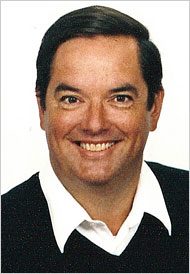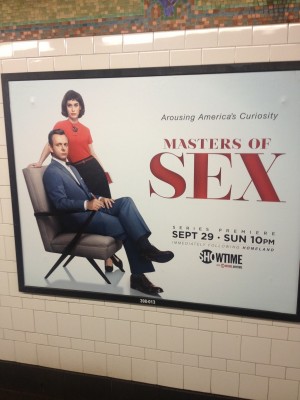Thomas Maier’s “Masters of Sex” Adapted for Showtime
October 6, 2013

The Observer: What first interested you in the story of William Masters and Virginia Johnson?
Thomas Maier: I was asked one day to do a quick story on William Masters, who was retiring, in 1994. I always had in the back of my mind that it would be an interesting book about Masters and Johnson: a man and woman, studying sex and love, who were not married, then become internationally famous, got married at height of fame, they’d been married for 20 years, then get divorced, and no one understands why, because they won’t talk about it. It always intrigued me and kept intriguing me ten years later. In 2005, I contacted Virginia Johnson and she agreed to cooperate…She was about 80 years old at the time, and she agreed to finally tell her story.
Observer: According to the Huffington Post, Masters and Johnson “sparked America’s 1960s sexual revolution still felt today.” Do you think that the world owes a debt of gratitude to Masters and Johnson?
T.M.: Oh yeah, definitely. They brought the discussion of sexuality into the forefront of
medicine; I think they brought it into the forefront of everyday media. If you go back and look [at] women’s magazines [and] daily newspapers, they really shied away from the discussion of human sexuality until Masters and Johnson used the clinical language that made it acceptable in polite company to discuss this. I think they brought the sexual revolution to the average American household, not to the fringes of society, but to the everyday Midwestern married couple that they were, right in the heartland of America.

Observer: Ultimately, how do you feel about the adaptation—casting, production, etc.?
T.M.: I’m extremely pleased with the way they adapted the book for the television series. I think they’ll go above and beyond the story itself. I think it will be a great drama. I think we’re very fortunate to have Michael Sheen, who I consider one of the best actors on the planet, who’s absolutely renowned in Britain, but is not as well known here in the US. I think he will become a very well-known figure before the series is done here in the United States. I think Lizzy Caplan is a terrific actress who has both kind of a Lucille Ball-like capacity for physical comedy, but I also think she will show her dramatic chops as the story progresses. Bear in mind, you could say that the book and the story itself is like a modern Pygmalion story in the sense that Masters is the boss and Virginia Johnson is the secretary who is in a very much unequal power situation. But through the dint of her work, her creativity and through the relationship between Masters and Johnson, Masters, who is this very renowned doctor, increasingly gives her more and more opportunity and more and more credit so that their first book, they share the same byline. I think it’s a really profound, understated expression of his fascination and love for her despite the extraordinary unequal and very feasibly argued abusive request that he makes at the beginning of their relationship…Masters, within the first year, had essentially required Johnson to have sex with him almost as part of the job requirement.…it started as a very unequal and arguably abusive relationship in terms of power between the two of them, and slowly we will see, hopefully over many seasons, how it becomes increasingly more equal and how Virginia Johnson’s contributions to the work, particularly in the development of their therapy, which [became] the basis for the modern sex clinic around the world.
Observer: What is it like to see your work plastered on every other bus ad in New York? How does it feel to be part of the “golden age of television”?
T.M.: It’s an out of body experience to see your book become a TV show like this. My sons were sending me .jpegs from their iPhones of the ads on NYC buses going down 5th Ave; there’s a billboard as you come out of the Midtown tunnel into Queens…It’s a remarkable experience. It’s just a reminder of how much impact television has in our lives and its preeminence as a medium in our society.
Observer: Do you think your Fordham education affected your career choice or “Masters of Sex” specifically?
T.M.: I took a class about American Biography. In many ways, I feel like I’m still in that class all these years later. It was probably my hardest one at Fordham, but a lot of my writing career is due to [its] influence… I think Fordham has a very great tradition in the literary arts, particularly in journalism. You could make a pretty good case that Don DeLillo, who went to Fordham, is America’s greatest living novelist. Mary Higgins Clark, another Fordham student, is one of the most popular of our time. It was the Bronx in the late 70s. In the 70s, there were a lot of things going on in the Bronx. It was a great place to be a student journalist—to learn to be bold, to try to write the hell out of a story, to think big about the broader issues going on in our society…There are really a lot of Fordham connections [in the show], in fact, at one point, the director John Madden and the producers said, ‘We really like the look of Keating Hall, can we use it as an exterior shot?’…I sent an email to Father McShane, and he was very deliberative about it and very gracious, but he declined to allow Keating Hall to be used in the TV show. Perhaps if the new pope had been in place, perhaps his response would have been a little bit different!
Observer: Do you have any advice for budding Fordham writers?
T.M.: Yeah, sure. First, read a lot and write a lot. I think you should try to be bold and go after the best stories you can find, to try and tell them as well as possible. Write every day. Never fail to write every day. Challenge yourself to be adaptive to this changing world of media that we are in. It’s a very different world then when I graduated from Fordham in 1978 as the executive editor of The Fordham Ram…I think that writers will face even more challenges in today and tomorrow’s media, but I think bringing stories of great humanity to an audience is as old as the hills, and a motivated writer will always find a way to tell their story.
The pilot of Showtime’s “Masters of Sex” is available on YouTube.












